Posted on 1/24/2018
No matter what vehicle you drive, when certain things break, you have to make a decision. Should I get it fixed now, later or never? Air conditioning is one of those things. You can certainly live without air conditioning, but it sure is nice to have on a sweltering day. Let's say your air conditioning breaks in the fall and you live in a climate where it gets quite cold in the winter. Should you get it fixed now, wait until spring since it won't get warm until then or maybe not get it fixed at all? That can be a tough decision. There are several reasons air conditioning in vehicles break. One is fairly simple: It could be an electrical problem, perhaps a relay or solenoid is not turning on the system. It's also a fairly inexpensive repair and doesn't require hours of labor. Or, the problem is that the coolant has leaked out. Your service facility can find the leak and replace the parts that are leaking. With a re ... read more
Posted on 1/20/2016
This is Little Bear's first trip to the snow. At home he hated the boots, but after putting his bare feet in the snow , he changed his mind and didn't think there were too bad. It took him a few minutes to get use to them and he could definitely walk better in the soft snow.
Posted on 7/29/2015
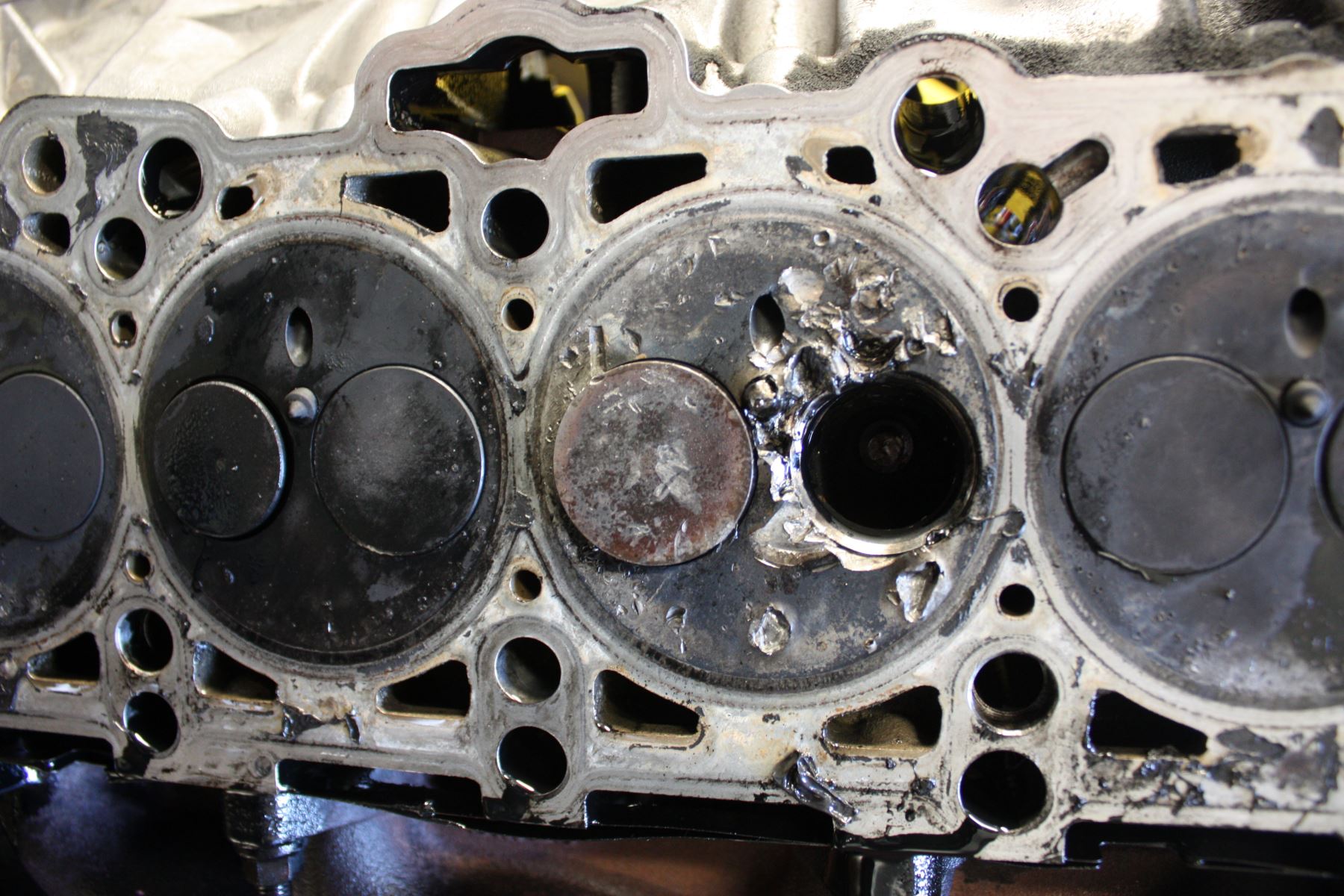
Here is a 2006 Volkswagen Jetta TDI with the cylinder head removed. It this case the timing belt did not break to cause this damage, but broken timing belt can and will cause similar damage. In this particular case it appears that the #3 fuel injector failed causing the cylinder to get drenched with fuel. The fuel either hydrauliced on the compression stroke and bent the exhaust valve or the valve stem got washed with fuel, was not properly lubricated, seized in the valve guide, made contact with the piston and this is the result. Picture #1 shows that the exhaust valve is missing from the cylinder head and the cylinder head is badly damaged. Picture #2 show the cylinder block with the piston in the down position. The wad of metal in the center of the picture is the #3 exhaust valve emended in the top of the piston. Picture #3 shows the cylinder block with the $3 piston in the full up position. Moral of the story; if your VW TDI start running poorly, get it in to us or a VW TDI expert ... read more
Posted on 7/28/2015
Sprinters are very complex vehicles. It takes a trained and seasoned Sprinter Technician to properly diagnose and repair your Sprinter. This Sprinter had been improperly diagnosed and repaired twice before it was brought here. Our Sprinter Technician used the proper tool and procedures to quickly and accurately diagnose and repair this van: If you drive a Sprinter, you already know that the dealership is outrageously priced on their services and repairs. Did you know that the dealership has a higher labor rate for Sprinter service and repair that other vehicles? I guess because they are bigger. We do not have higher prices for the service and repair of Sprinters. Our Sprinter Technicians are factory trained, we have the Factory Level Diagnostic Tools and we subscribe to the same Sprinter Technical Service Company that the dealerships do. But, we have a 3 year, 36,000 mile warranty, the dealership ... read more
Posted on 7/27/2015
If you have an engine rattle in your Subaru or are just in search of the Best Subaru repair shop in the Inland Empire, take a minute to watch the short video below: Subarus are a very complicated yet reliable vehicle. If properly maintained that can last seemingly forever. If serviced or repaired by a an untrained mechanic that doesn't have the proper tools and equipment, it can be a nightmare. Our Subaru trained and certified Technicians have the knowledge and training to take care of ANY of your Subaru's needs. We have all the Factory level tools and equipment and back all of our Subaru Technician's work by the Best Warranty in the Automotive Industry: 3 years or 36,000 miles Parts and Labor. So, if you are looking for the Best Subaru service and Repair shop/facility in Temecula, Murrieta, Winchester, Menifee, Lake Elsinore of Fallbrook. You have come to the right place. All services include pictures or a video of what we found upon inspection. We will gain your trust Eve ... read more
Posted on 5/15/2015
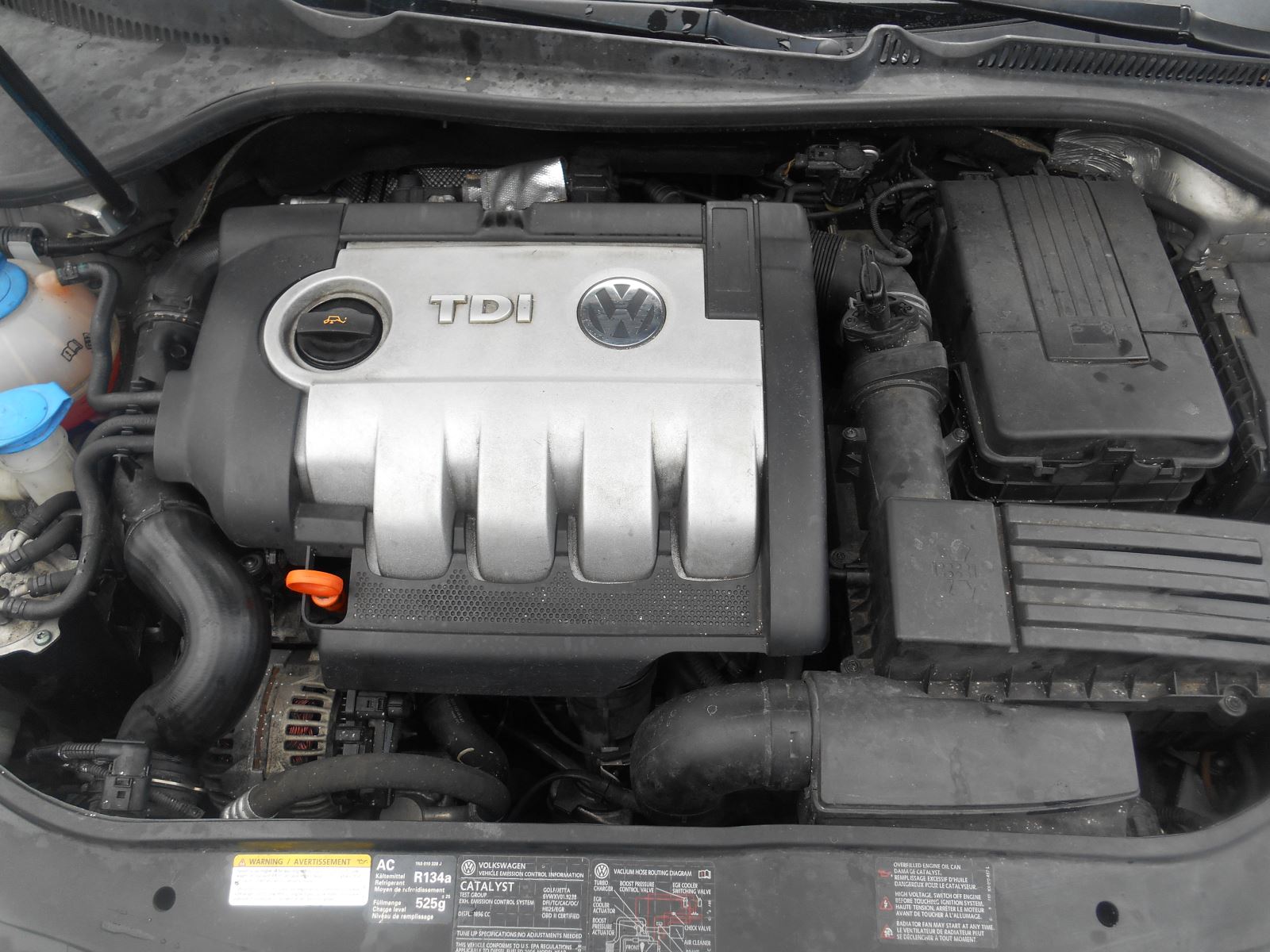
We have run into several cases of 2004-2006 Volkswagen and Audi TDI that came in with a loud engine ticking noise and possibly with the Check Engine Light illuminated. It is unclear if lack of oil services or using improper oil is the cause of the camshaft and lifter failure. VW recommends engine oil VW spec 505.01. We find that it is most common for #1 and #4 intake lobes and lifters to fail first. We have not seen any information to explain this occurrence or proof that lack of oil services can cause or increase the likely hood of this occurring. On the vehicle shown, it was #1 intake camshaft lobe and lifter that failed first and had the most damage. Because of the specialty tools required and very technical nature of this repair it is not recommended that this repair be performed by anyone that is not a skilled and trained VW | Volkswagen Technician. If you think you may be experiencing this problem, the sooner you can get it inspected the less damage will occur. If you live anywhe ... read more
Posted on 1/30/2015
Watch this short video to see what it takes to get to the coolant leak on this 2008 Mini Cooper S We had a 2008 Mini Cooper S come into the shop with a very slow coolant leak. We added dye to the cooling system, got the vehicle up to running temperature and pressurized the cooling system over night. In the morning we found the coolant was coming from behind the heat shield of the turbo. We advices the client that the front of the vehicle and the turbo shielding had to be removed to gain access and inspect the coolant leak. The client approved the dis-assembly and inspection. After dis-assembly of the Mini Cooper, we found that the gasket between the oil filter stand and the engine block was leaking coolant. It is much more common for the gasket between the oil cooler and the oil filter stand to leak. That is precisely why we add dye to the coolant before dis-assembly to ensure we pin-point the leak and get it repaired right the first time and on time. If you are looking for Mini Coope ... read more
Posted on 1/20/2015
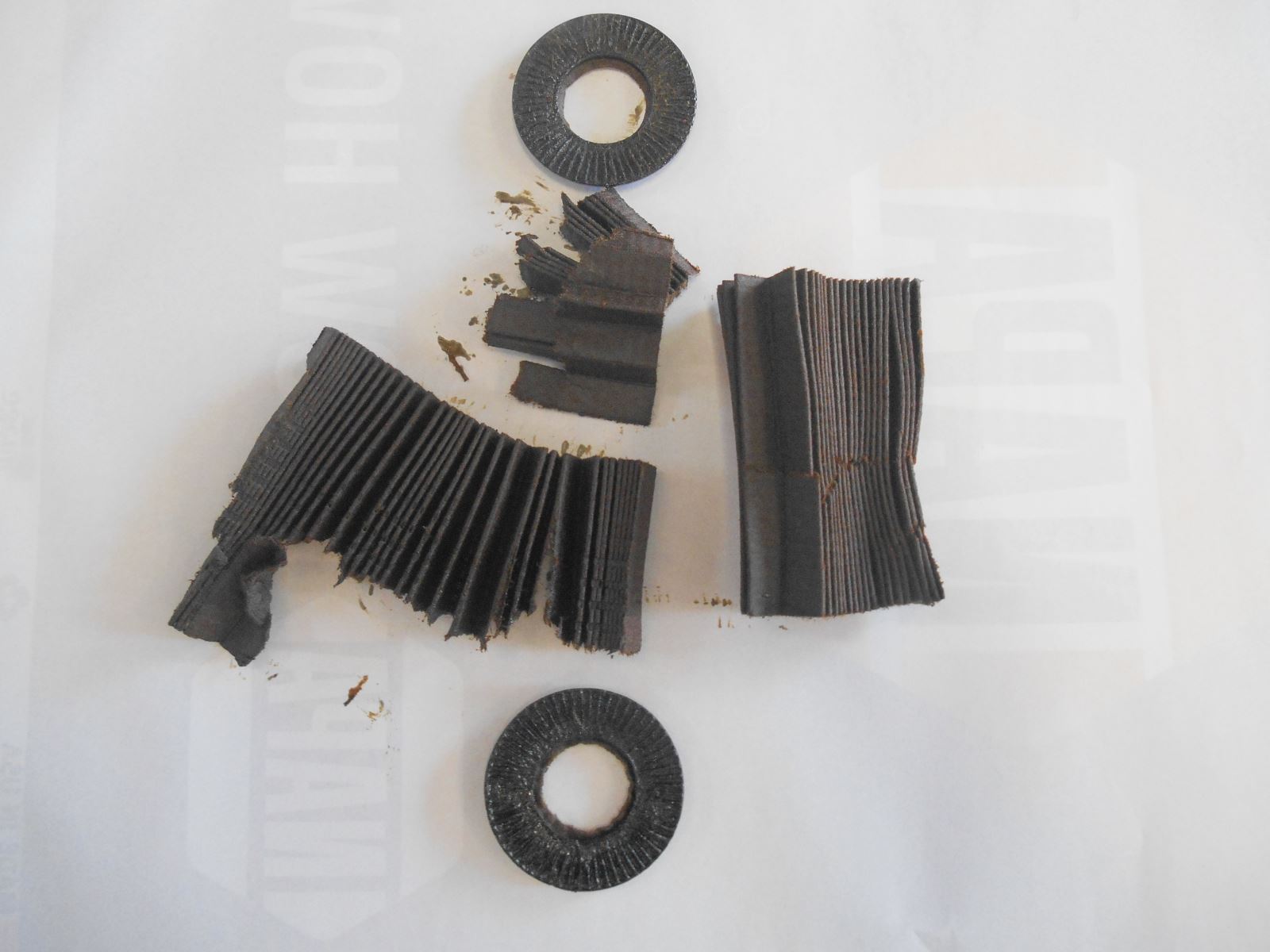
Aren't all oil changes/ Oil Services the same?The picture below are from a new customer's Mercedes Benz ML500. He had been bringing his Mercedes into the local lube joint for the last few years. He trusted them and thought that they could keep him informed of his vehicle's service needs. Only when the coolant bottle started to leak and they said that they "don't do that type of repair" did he search us out. We replaced his coolant bottle, performed an oil service and check all of his fluids (see fluid sample picture). Even we were surprised to see an oil filter in this condition (see oil filter picture). We had to remove all the pieces of the filter from the oil filter housing with a pair of needle nose pliers. It turns out that the lube shop that he has been patronizing for all of those years, doesn't stock the oil filter for his vehicle, so they just didn't replace it. As you can see the transmission fluid, power steering fluid and brake fluid is in bad co ... read more
Posted on 1/18/2015
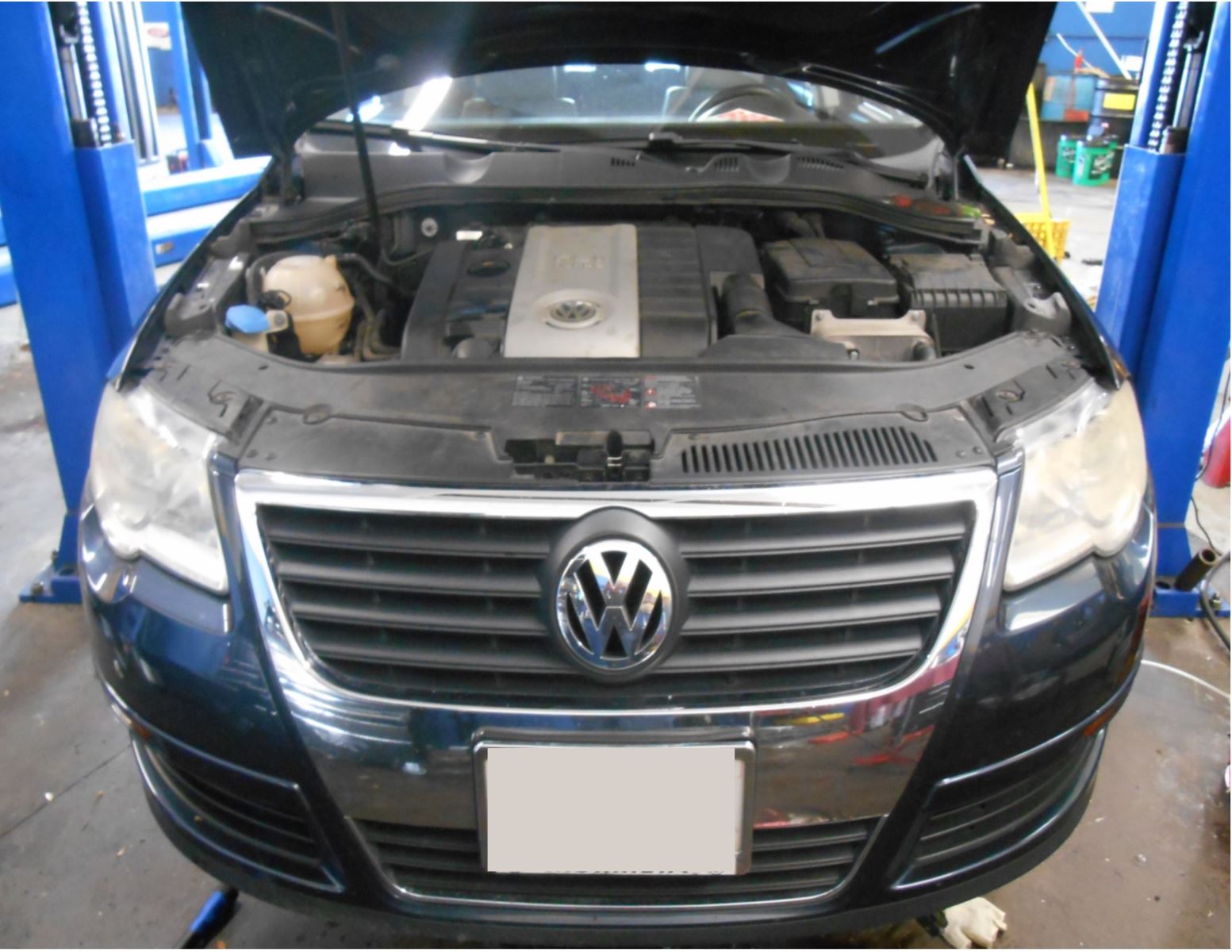
When it comes to repairing oil leaks on your VW | Volkswagen, it is very important that you go to a repair facility that really know how to repair your VW. As you can see in the pictures below, it takes a well trained technician with years of experience to properly service your Volkswagen. In this series of pictures we show the steps to replacing an oil filter stand gasket. The entire front of the vehicle has to be removed. To remove the front of the vehicle the air conditioning system has to be evacuated. The cooling system has to be drained and he radiator hoses have to be disconnected. May sensor and electrical connectors also have to disconnec ... read more
Posted on 12/17/2014
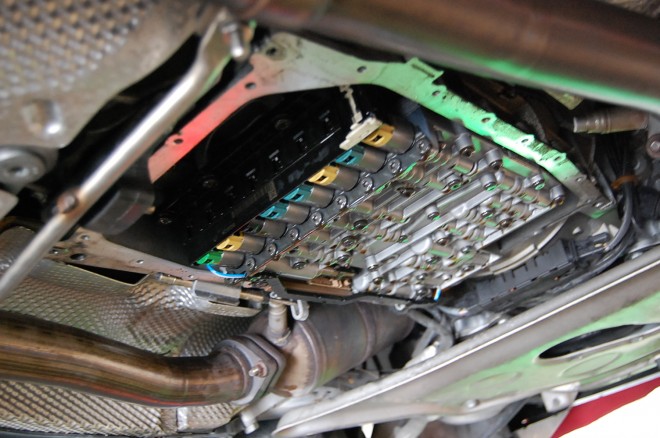
Perform Transmission Fluid Service By ‘Severe Duty’ Change Intervalby AutoCarePro Team - Nov 18, 2014 Improved lubricants have allowed service intervals to extend for many vehicles with automatic transmissions, utilizing “lifetime fluids.” In the past, service recommendations for automatic transmissions were based on time/mileage tied to requirements of new vehicle warranties (2-3 years or 30,000 miles). Lifetime fluid recommendations are now 5-10 years or the life of the vehicle (100,000 miles) unless the vehicle is subjected to “severe duty.” The question that often comes up next: When is it appropriate to perform a fluid service? Taken directly from OEM owners’ manuals, “severe duty” has historically been defined as: • Operation o ... read more